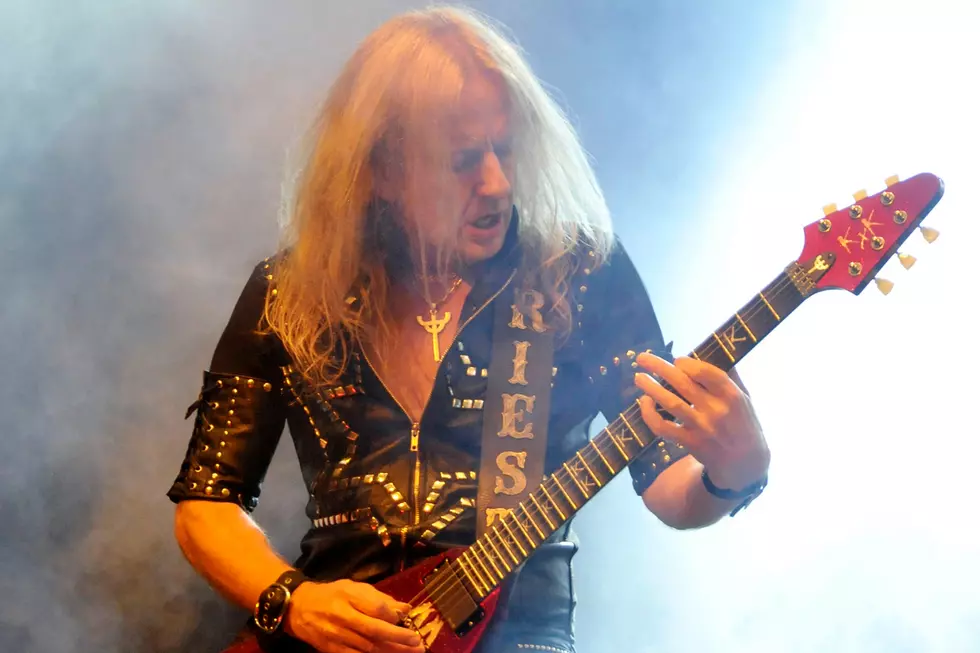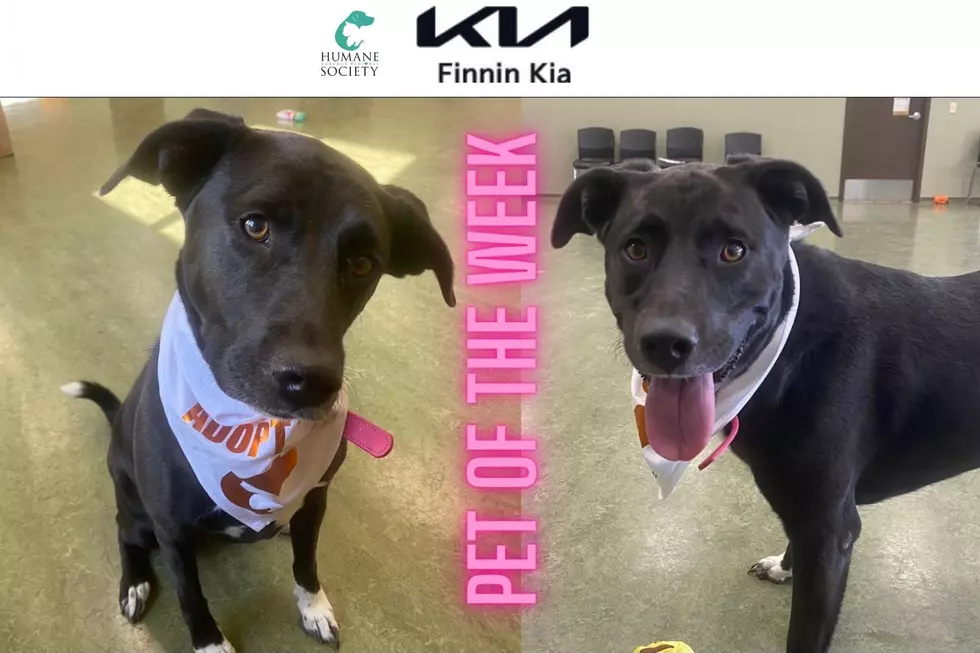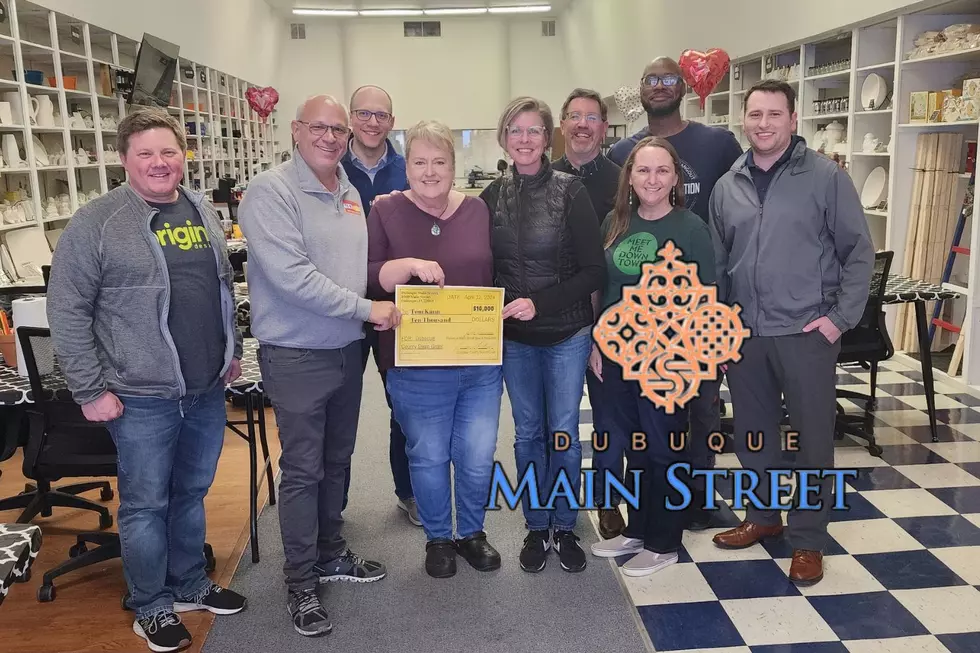
Why K.K. Downing Always Wanted Judas Priest to Sound ‘Heavier’
Guitarist K.K. Downing was one of the first classic-era members to join Judas Priest and a key architect in helping the metal band develop its sound. He now says he was always pushing for their music to be "heavier."
Downing was there for the band’s first gig on March 6, 1971, and survived the early growing pains as Judas Priest went through several lineup changes.
The group’s first album, Rocka Rolla, arrived in 1974. By that point, Judas Priest included Downing, singer Rob Halford, guitarist Glenn Tipton, bassist Ian Hill and drummer John Ellis. The band began its musical evolution on these initial recordings, including a few songs that approached progressive rock. But it wouldn’t take them long to establish a blueprint, and 1977’s Sin After Sin was the first in what became a long series of gold and platinum albums for Judas Priest.
Downing retired from the band in 2011, although he later explained the real reason for his departure. The guitarist lobbied for a return, but the door was closed - something he says he's since made peace with. “Bands have a long history of self-combusting, and sometimes they all leave at the same time,” Downing tells UCR. “They go in different directions. Then they all come back years later. It’s what’s done but anyway not to be.” He's now moving forward with KK’s Priest, which includes former Judas Priest singer Tim “Ripper” Owens. Their debut album, Sermons of the Sinner, arrives on Oct. 1.
This year marked the 50th anniversary of Judas Priest's first show, but your history with the group goes back even further. How do you take stock of it all when you look at what you helped bring to life?
It’s quite something, really. When I was a young teenager, there wasn’t any music around for people like working-class white kids in the U.K. That’s why a lot of the greats, [Eric] Clapton and [Jimmy] Page and [Jeff] Beck, all of those guys, they looked to the Black blues artists for [inspiration]. And they really enjoyed, as I did, that music. Those guys in those bands went on to create progressive blues - their version, like extending solos and stuff like that, and doing their interpretations. If you listen to “Crossroads” by the Cream, it can be a 10-minute live version with the improvised solo. All of that was great stuff. That kind of paved the way and got the ball rolling, really. Because so many great bands came out of that: Fleetwood Mac, Blodwyn Pig, Ten Years After, Jethro Tull, Wishbone Ash, the list goes on and on of progressive blues bands. Then we went onto rock, I guess, and then hard rock, and the rest is history. It’s great to have been a part of that evolution of music as we know it today.
On the debut album, Rocka Rolla, there’s the “Winter/Deep Freeze/Winter/Cheater” suite that takes up a large portion of Side One. It has such a progressive feel to it and shows that, musically, the band could have taken a different turn. What was influencing the musical exploration on that album?
Obviously a lot of that came about when we were a four-piece. I must confess, I was always the darker type - I was always wanting [Judas Priest] to be heavier and more meaningful, and show more emotions and stuff like that. In those early days, because it would seem to be something that there wasn’t enough of. When I first heard Black Sabbath, I thought, “Thank you for that! Hallelujah, there’s hope!” I mean, it wasn’t exactly where my mind was at, but it was really pleasing that that came about. I was really so happy, and those guys are from Birmingham as well and that was wonderful. It was such a long time ago. But maybe I’m going to revisit some of that stuff and maybe play it live, and start to look at that style again. Which would be very cool.
Listen to Judas Priest's 'Winter / Deep Freeze / Winter Retreat / Cheater'
You've already done a bit of that. It was great seeing you go back to "Before the Dawn" from Hell Bent for Leather. What brought you back to that song?
I just think that I’d always wanted to play it, and we never played it. It was pretty unique, really, to play that song. It’s quite magical. It’s not an easy song to play, musically and stuff. But it’s a pretty emotional thing, I think. I have no idea why we never played that. And Rob never sang it. It’s kind of sacrilege, really.
It takes a lot of work to build an audience. Judas Priest played their first U.S. show in June 1977 with REO Speedwagon. What do you recall about that experience?
It was just the most wonderful thing ever. When I look back on it now, obviously the first tours were a mix of clubs and arenas. It was crazy. Our managers said when you go to America, don’t expect to get anything because you won’t, so if we have to go onstage with no lights and no monitors or whatever it was. All these things were said, you know. Because that’s just the way it was. I remember when we supported Kiss, I didn’t have any monitors, because I was on the stage here, and Gene [Simmons] was up there - that’s where the monitors were. But it just didn’t matter. Because we were in America and playing to American people. You can imagine, we were like kids in a candy shop. Everything was wonderful. But it held us in good stead, because it was a real testing ground for temperament and everything. We just got on with it, military-fashion.
We became very strong and confident. We were happy to support anyone. When we got to fly to the west coast to do those two shows with Led Zeppelin, it was just unreal. Can you imagine? It was like we’d won the lottery as young musicians. It was a lottery win, more than once.
You start out in America, playing in Amarillo, Texas. A couple of months later, you're sharing the stage with Led Zeppelin in a much larger venue. That must have been pretty hard to comprehend and process.
Oh, absolutely. And it was great, because we're all from the same place. And that was quite an experience. But I’ll always remember what we couldn’t get our heads around was how fantastic the radio stations [were]. It was all about radio. You’d drive into town, and there would be several radio stations, all playing rock. We just don’t get this in England. Zero. It was amazing that many bands came out of the U.K. and did well, considering [it was] without radio support.
Did you meet the Zeppelin guys?
We got to say hello to Robert [Plant] backstage. He married Maureen [Wilson], from West Bromwich, the town I was born in. It’s very small, and I used to hang around there in coffee bars with Maureen’s brothers, Glenn and Bruce. So it was a very, very small-knit community. John Bonham was from Dudley, which is about a mile and a half up the road. It was all like that, it was great. Later on, we shared the same management as Plant and Page for many years. So we got to meet. Robert now lives just a few miles from where I live. From where I’m sitting now, there’s just a river in between, and he’s on the other side of the river.
The Best Rock Movie From Every Year
More From Eagle 102.3







